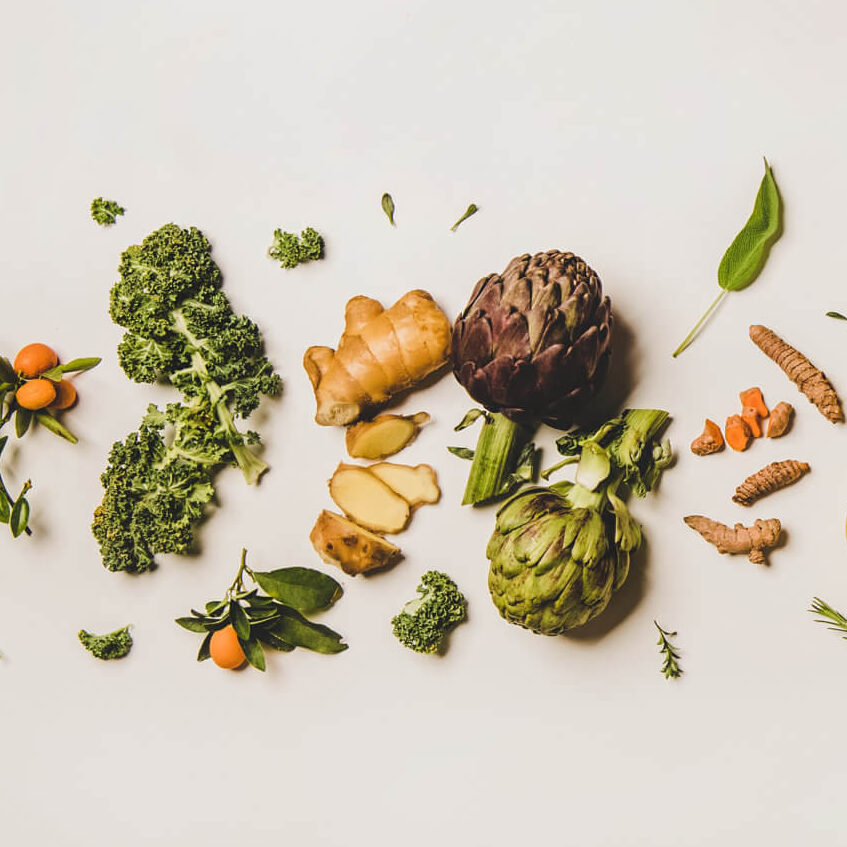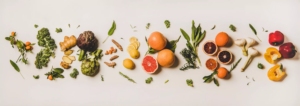
You are what you eat, and so is your immune system. Here we learn about the effect of good nutrition on viral infections.
As the COVID-19 pandemic unfolded, many of my clients asked me if there was anything they could do to boost their immunity against the virus. It’s important to understand that there can be no specific immunity against a virus that has been newly introduced into the human population, like SARS-CoV-2, the virus that causes COVID-19. It’s only after people have contracted the virus that they can become immune to reinfection, and it’s not clear at this point how long that immunity may last. However, if we are in excellent health, our immune systems can effectively combat viral infections with minimal ‘collateral damage’ to our bodies. Research clearly shows that our state of health, and specifically our nutritional status, is the key determining factor as to whether we will develop any symptoms when we contract a viral infection, and how severe those symptoms will be. There is no true immunity without health.
WHY WE NEED GOOD NUTRITION
So, let’s take a closer look at the impact of nutrition on our immune system. If we suffer from protein-energy malnutrition, this has a devastating effect on immunity. This is not only an issue in the developing world, but also right here in Australia among many of our elderly as well as in sufferers of anorexia nervosa and many debilitating diseases, such as cancer. The various functions of the immune system are all significantly impaired in people suffering from this kind of malnourishment. However, the more common type of malnourishment in affluent Western countries is what we call high-calorie malnutrition. This refers to the overconsumption of foods that are deficient in micronutrients such as vitamins, minerals and phytochemicals – including highly processed foods and many animal products. Even relatively mild deficiencies of these micronutrients handicap our immune defences. For example:
- Both vitamin B6 and folate deficiencies reduce the number and the effectiveness of B and T lymphocytes. These are the immune system cells that directly combat viral and bacterial infections.
- Vitamin A deficiency impairs the production of antibacterial compounds in tears, saliva and sweat; causes shrinkage of the lymphoid tissue (a critical component of the immune system); and reduces the formation of antibodies (targeted proteins that neutralise bacteria and virus- infected cells).
- Deficiencies of iron, zinc and magnesium all increase susceptibility to infection (although an excess of iron has the same effect).
In addition to vitamins and minerals, a host of other plant-derived micronutrients known as phytochemicals (such as lutein, lycopene, bioflavonoids, and polyphenols) also affect both our susceptibility to infectious disease, and the severity of such diseases. Many of these phytochemicals are produced by plants to defend against being eaten by insects or attacked by pathogens.
For example, the powerful polyphenol called resveratrol, found in red grapes, mulberries, peanut skins, rhubarb, and several other plants, is essentially part of the immune system of the plants that produce it. Grapes under stress from poor soil and challenging climatic conditions or those under attack by fungal disease produce this in much higher amounts. The same compound, at the low concentrations found naturally in our diet, activates immune cells that defend us against viruses, bacteria and other invaders. (But be warned – in high doses, such as those delivered by supplements, resveratrol may actually suppress immunity, which is the opposite of what you want.)

HOW DEFICIENCIES TURN DEADLY
While nutritional deficiency has long been known to depress our immune function, there is an even more intriguing twist. Nutritional deficiencies directly interact with the genomes (DNA sequences) of pathogens themselves, making them more dangerous to us.
If our diet is deficient in antioxidant vitamins, minerals and phytochemicals, we will experience oxidative stress. This oxidative stress alters the genome of invading viruses, causing them to mutate into potentially more dangerous forms that can result in more prolonged and serious infections. For example, a virus called coxsackievirus B3 is normally quite benign and only causes symptoms of the common cold. However, oxidative stress due to a deficiency of either vitamin E or selenium causes this virus to alter its DNA sequence to more closely resemble that of a strain of coxsackievirus that is capable of causing heart damage. Viruses can only replicate, and therefore can only mutate, when they are inside the cells of a living host. This is why our state of nutrition when we become infected is the main factor determining whether the virus remains fairly benign or becomes much more dangerous.
Unfortunately, a large proportion of our population is at increased risk of complications from viral infections because they are micronutrient-malnourished. Remember, micronutrients are found in their highest concentrations in whole plant foods. Yet 95 percent of Australian adults fall short of the recommended daily intake of fruits and vegetables, 73 percent fail to meet the recommended daily target for whole grain consumption, 92 percent rarely eat legumes, and 94 percent don’t eat the recommended amount of nuts.
In addition, older people are more susceptible to complications because chronic low-grade inflammation, known as ‘inflammaging’, naturally occurs as people get older. Inflammation generates increased pro-oxidant compounds. Cigarette smokers also have higher risk due to the oxidative stress and chronic inflammation caused by smoking.
This is why COVID-19 and other respiratory pathogens pose a greater threat to elderly people and those who have cardiovascular disease, diabetes, chronic respiratory disease or cancer. All these conditions are associated with chronic inflammation and oxidative stress, which impair immune responses and increase the likelihood of complications of infection.
SYMPTOMS ARE PART OF THE CURE
Most of the unpleasant symptoms of an infection, such as fever, sore throat and fatigue, are not directly due to the virus, but to our own immune system’s response to it. Specifically, they are caused by the release of inflammatory chemicals by our immune system. It’s important to understand that these acute inflammatory responses are crucial for overcoming infection. Fever, for example, dramatically slows down the rate at which viruses reproduce inside our cells, and boosts the effectiveness of the immune response to invading pathogens. An increase of 1 to 4°C in core body temperature speeds up recovery from infection, while the use of drugs to reduce fever, such as Panadol and Nurofen, correlates with a 5 percent increase in the death rate of people infected with influenza virus.
The symptoms of disease are actually part of an organised effort to restore health. That is, the symptoms are part of the cure. However, dietary antioxidant deficiency ramps up the inflammatory response in a way that causes much greater damage than would occur in a well-nourished person. Put simply, when we are deprived of antioxidant nutrients, viral infections can cause serious, even fatal diseases, that don’t occur when a deficiency is not present. These include the serious complications of COVID-19 infection, such as respiratory distress, shock, and multiorgan dysfunction, which have unfortunately led to well over 200,000 deaths globally.
The best way to protect ourselves against serious complications from SARS-CoV-2, or any other virus, is to support our immune systems through cultivating good health. And foundational to good health is good nutrition. The diet I personally adhere to, and advocate to all my clients, emphasises a very high intake of fresh, raw or conservatively cooked fruits and vegetables, along with other antioxidant rich plant foods. Isn’t it wonderful that the same diet that prevents and often reverses chronic disease, also protects you against acute viral infections? That’s the power of plants!





















